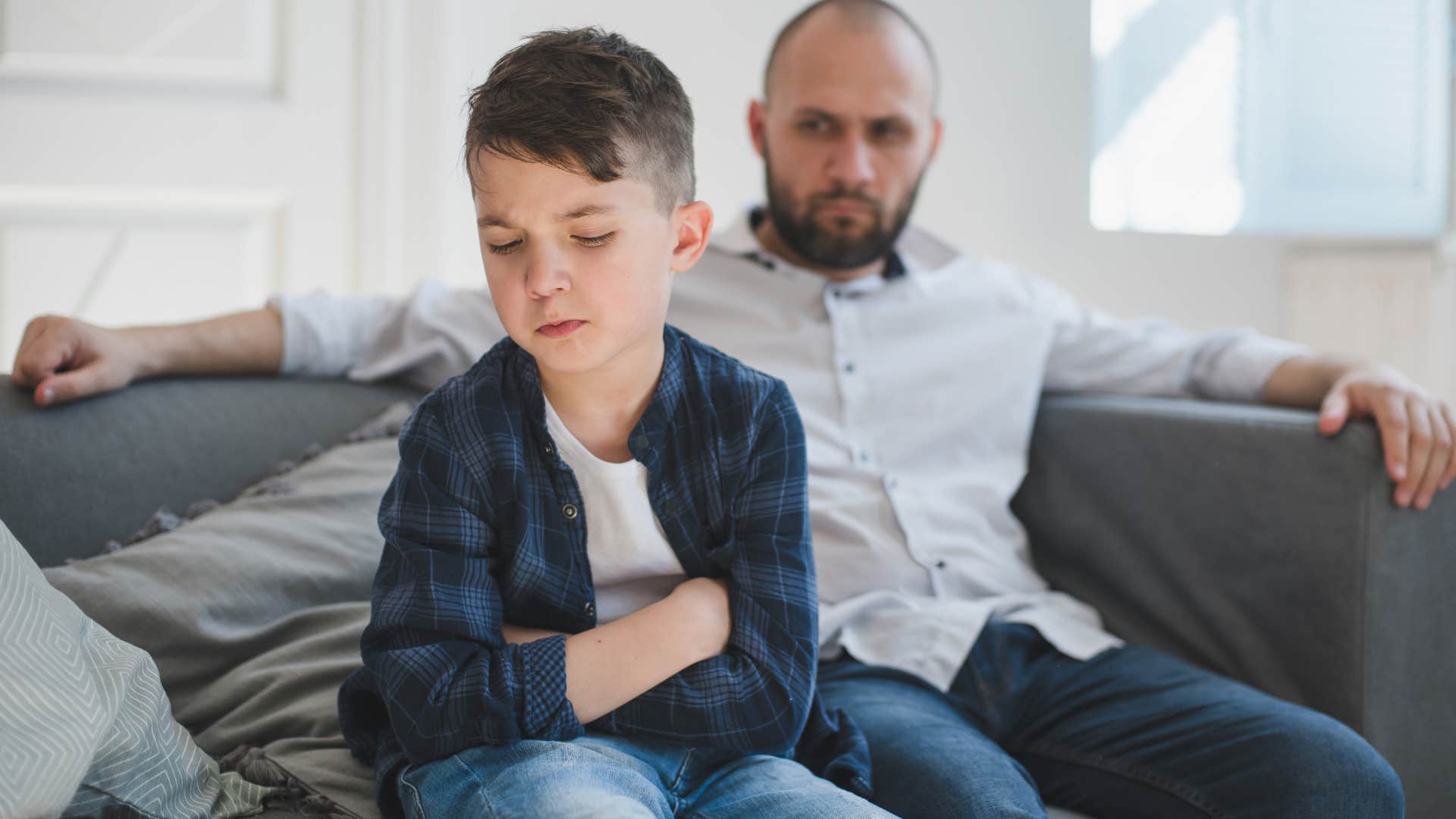11 Things Adult Children Secretly Resent About Their Parents But Rarely Say Out Loud
Childhood trauma is already complex, and acknowledging and healing from it can be that much harder.
 Evgeny Atamanenko | Shutterstock
Evgeny Atamanenko | Shutterstock There's an inherent link between our childhood experiences and our adult realities that many of us are unfortunately unraveling today, struggling with unhealthy coping mechanisms, misguided beliefs on relationships from our parents, and even low emotional intelligence and deep-seated insecurity as a result of superficial conversations at home. However, it's difficult to have conversations with parents about these experiences — not just because they're not open to them, but because it can feel like more trouble than it's worth to blame.
When these frustrations continue to linger, though, they often manifest themselves into things adult children secretly resent about their parents but rarely say out loud, latching onto adult children's well-being and sabotaging their current family relationships. By bringing them out into the open or actively addressing them to heal, adult children can protect their sanity and also move forward in a much healthier and intentional way.
Here are 11 things adult children secretly resent about their parents but rarely say out loud
1. Their lack of vulnerability
 voronaman | Shutterstock
voronaman | Shutterstock
Parents with emotional intelligence, who have the emotional availability to be vulnerable, provide intentional support to their kids, and engage in healthy communication at home are incredibly important to their kids' well-being, according to a study from Brain Sciences.
From feeding into their own emotional intelligence and self-esteem to equipping them with better social skills to build meaningful relationships, the emotional availability of your parents is important.
Of course, many children don't receive that kind of deeper affection and emotional connection from their parents, sparking more insecurity, self-doubt, and disillusion in their minds as they get older and try to look out for their mental health and form long-lasting connections.
Even if they were there physically — offering up affection and physical support — the lacking emotional side is one of the things adult children secretly resent about their parents but rarely say out loud.
2. Their unrealistic expectations
 tairome | Shutterstock
tairome | Shutterstock
While unrealistic expectations aren't always intentionally malicious toward children, parents who hold their kids to impossible standards often spark a cycle of disappointment, low self-esteem, and frustration in their kids. If they don't grow into toxically "perfectionist" adults, they're likely struggling still to deal with the internal insecurities and lacking self-worth sparked by never living up to their parents' expectations.
Especially if the relationship was transactional — with reward and punishment structures or more praise when these expectations were met — their kids are likely secretly resentful about the way their relationships today have developed as a result.
3. Being used as a scapegoat
 Amnaj Khetsamtip | Shutterstock
Amnaj Khetsamtip | Shutterstock
The key to teaching children to own their own mistakes and learn to apologize growing up is to model this behavior consistently; however, a lack of accountability is one of the things adult children secretly resent about their parents but rarely say out loud.
Especially in households with narcissistic or wildly insecure parents that chose their kids as scapegoats for their own misbehavior, it wouldn't be surprising if these adult children now struggle with anxiety or shame.
They were forced into a state of constant "fight-or-flight" mode, on edge for when they would have to defend themselves or avoid an argument with a parent who refused to own up to their mistakes.
Having a blame-shifting parent who constantly relied on a victim mentality can feel disillusioning as a child, but as an adult, there's ways to acknowledge their poor behavior and take strides to coping and healing from the defense mechanisms you've been forced to adopt as a result of it.
4. Not being able to talk about mental health
 fizkes | Shutterstock
fizkes | Shutterstock
Many older generations struggled with overcoming the mental health stigma they were taught growing up in their own families, continuing to paint vulnerability and emotional expression as a "weakness" and mental illness as something everyone should "overcome" to their own kids.
While it seems like a perfectly acceptable mentality for them to adopt, younger generations today are finally challenging these traditionalist ideas and speaking about mental health in a more accessible and inclusive way.
A lot of adult children, as a result, are finally reconciling with the resentment they're holding onto for not being met with support, acknowledgement, or empathy growing up with a mental illness. Not only did they likely miss out on vulnerable and open conversations with their parents, they were also demonized simply for struggling.
5. Favoritism between siblings
 fizkes | Shutterstock
fizkes | Shutterstock
According to a study published in Psychological Bulletin, parental favoritism between siblings isn't a myth. Many parents actually do have a favorite child and feed into habits and routines that actively uplift, support, and praise them at disproportionate rates to the rest of their kids.
Of course, children who are less favored by their parents are more likely to develop poorer mental health outcomes, more stress, and resentment — not just toward their parents, but also their other siblings, according to the study's researchers.
That's exactly why this is one of the things adult children secretly resent about their parents but rarely say out loud — they're not only disturbed and frustrated by being treated unfairly by their parents, they're resentful about the disconnect they were forced to adopt with their siblings, as well.
6. Being parentified
 fizkes | Shutterstock
fizkes | Shutterstock
According to a 2023 study on parentification, it's not always bad when kids are parentified from a young age — in some cases, it can teach them resilience, maturity, and independence. However, many of the resentful adult children who were parentified against their wishes experience very opposing consequences like depression, anxiety, relationships struggles, and even hyper-independence.
Parents are the people who are supposed to take care of you, craft a safe space for you to thrive, and provide affection, guidance, and support — many of the children who were parentified were forced to do all of these things for themselves, and sometimes their siblings as well.
7. Having their boundaries disrespected
 Drazen Zigic | Shutterstock
Drazen Zigic | Shutterstock
According to clinical psychologist Samantha Stein, mutual respect is the foundation for any kind of relationship, but especially for family dynamics and parent-child relationships. When a child's boundaries don't feel respected, they grow up struggling to truly assert themselves, advocate for their needs, and communicate their boundaries to new partners, peers, and friends.
The resentment sparked from childhood disrespect is one thing, but having to grapple with the aftershocks of this misbehavior in adulthood can make it that much harder to heal from.
8. Minimizing childhood trauma
 Comeback Images | Shutterstock
Comeback Images | Shutterstock
Especially in today's world, where so many younger generations are grappling with childhood trauma, acknowledging the roots of these issues, and talking about the link between childhood experiences and adult realities much more often, it's not surprising that there's more conflict between them and their parents.
Many people are going "no-contact" with their parents following this discussion of childhood trauma, not because they're unworthy of forgiveness, but because they refuse to acknowledge, apologize, or even talk about situations or recollections they don't agree with. They'd prefer to minimize and invalidate their kids, in ways that can spark a great deal of resentment over time, than support them as they share their stories and emotions.
Here's a reminder for everyone: it's possible to support someone you love, regardless of whether or not you agree with their opinions, memory, or experiences. You can actively listen, acknowledge their feelings, and even apologize without having to resort to defensiveness.
9. Their need for control
 PLotulitStocker | Shutterstock
PLotulitStocker | Shutterstock
According to therapist Ashley Graff from the Anchor Light Therapy Collective, overbearing and controlling parents rely on a sense of authority to parent their children — embodying a cold, rigid, and unemotional attitude, rather than a thoughtful, affectionate, and understanding one.
Without the empathy, affection, and compassion adult children need to thrive growing up, these parents tend to sabotage their kids' well-being — emotionally, mentally, and physically.
They not only grow up without a great sense of self-worth and self-esteem, they take on misguided beliefs around relationships, believing that emotional manipulation, poor communication, and control are normal, because the person who was supposed to look out for them broke their trust.
Resentment can look different for everyone — it's a nasty, lingering, and shame-fueled experience that makes people irritable and frustrated in the most unsuspecting of situations. To truly address it, you have to lean into the discomfort that makes it so hard to grapple with — finding closure, healing, and growth in the experiences you've been avoiding addressing.
10. Their conditional love
 Olena_Honcharova | Shutterstock
Olena_Honcharova | Shutterstock
According to psychotherapist Kaytee Gillis, parents with conditional love and transactional parenting styles teach their kids the misguided idea that they're only worthy of affection, support, and love when they have something to offer.
This belief not only sabotages kids' self-worth into adulthood, it ensures they fall into a cycle of insecurity, where they believe they're inherently flawed and undeserving of love because of their parents' poor parenting. We need consistent and stable love from our parents to feel secure; otherwise, we're always searching for someone — or rather, "settling" for someone — who offers us a sliver of the love that we wanted from our parents.
11. Feeling unaccepted at home
 Pheelings media | Shutterstock
Pheelings media | Shutterstock
Feeling accepted for your authentic self by your parents is key to how you live your adult life, from crafting goals, to building routines, maintaining relationships, and even parenting your own kids.
Children who were never accepted for who they were grow up battle low self-worth, often seeking external validation and misguided attachment later in life to people to cope. It's also a matter of security in this relationship — parents who don't accept their kids and demonize their identities create a tumultuous, rather than a safe, space for their kids to struggle through growing up.
They're forced to adopt not only deep-seated insecurity, but a sense of emotional turmoil and anxiety that fuels all of their everyday interactions, all because their parents refused to be a safe, secure, and supportive place for their kids to find solace in.
Zayda Slabbekoorn is a staff writer with a bachelor's degree in social relations & policy and gender studies who focuses on psychology, relationships, self-help, and human interest stories.

